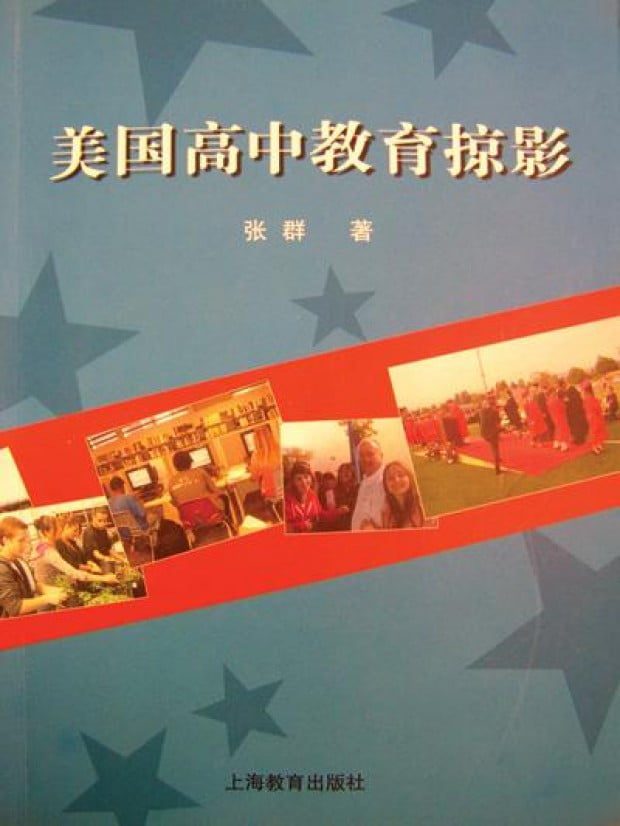
A high school principal from Shanghai wrote a book (left)about American education after returning from a trip to Malibu. Most of the book is based on Malibu High School.
By Knowles Adkisson / The Malibu Times
Nimish Patel, a board member of the Santa Monica-Malibu Unified School District, returned from a trip to China last month bearing a gift of a book, written about American education by a high school principal in Shanghai, that centers mostly on Malibu High School. The principal, Chuen “Charlie” Zhang, visited Malibu and Santa Monica for four weeks in 2008 as part of an exchange program for school administrators.
The book, titled “A Snapshot of American High School Education,” features photos of Malibu High School’s campus, Malibu’s beaches and MHS Principal Mark Kelly, and is written entirely in Mandarin Chinese.
Sally Chou, chief academic officer at SMMUSD, helped translate some excerpts for The Malibu Times.
Zhang wrote that “Malibu [High School] is a public school without a long history, but it skyrocketed to the top 100 schools,” noting that U.S. News & World Report ranked MHS 98th among public schools in the United States in 2007. The book extols the openness and interaction between students and teachers in America, which is vastly different from the more formal education system in China.
Education in China is a highly esteemed field and the best administrators enjoy near celebrity status. Zhang and the other administrators who visited Malibu in 2008 were ranked the top four principals in Shanghai, literally.
“They actually have these top 20, top 50, top 100 principals, they do that,” Chou said.
Zhang and the other administrators shadowed Kelly during his workdays at Malibu High and came away impressed.
“Principal Mark,” Zhang wrote, was “very much a gentleman.”
Kelly’s habit of talking with students in the hallway and urging them to get to class on time was much remarked upon by the Chinese visitors.
Kelly told The Malibu Times that two groups of principals have visited since then to observe him during school hours, and he has made two return trips to Shanghai.
“It’s interesting to have another person who does similar work to what you do [observe you],” Kelly said. “The systems are a little different, but the goals and the ownership of responsibility and the feeling of ownership of the whole thing we share. So there were many things we found in common and many things we found different.”
Kelly said the principals who have visited since the first group in 2008 have been younger, possibly reflecting a desire among Chinese administrators to incorporate American attitudes of interaction and openness to their teachers and students in Shanghai.
“They seemed impressed by how our kids kind of expressed themselves,” Kelly said. “That’s not to say that when I visited schools in Shanghai the kids are passive, that’s far from the truth, but it’s not common, for example, for a group of students to come into a classroom and hang out with a teacher during lunchtime. That wouldn’t happen in Shanghai.”
Kelly said a unique aspect of Chinese education is that educators teach far fewer classes during the week than their American counterparts. In their extra time, they collaborate with other teachers to analyze teaching methods and other subjects.
“The idea that they try to get better and better at teaching is just imbedded in the culture,” Kelly said.
Board Member Patel, who carved out time during a business trip to Shanghai to observe some classes, admired the innovative lessons of the Chinese teachers. In one English class, the teacher combined lessons about grammar and vocabulary with a discussion of the atomic bomb and Hiroshima. She played YouTube clips and videos, then prompted a discussion.
“They were learning history, they were learning science because they were talking about the atom. It was a cross-section of learning,” Patel said. “They had a rule in the class that you had to speak everything in English.”
Patel said the high regard Chinese students hold for their teachers was apparent. In one class, the word of the day was “genius.” The teacher explained the meaning of the word, then asked the students to give examples of geniuses they knew.
“They said Albert Einstein, Michelangelo … then one student raised his hand and said it’s you, teacher Wang, you’re a genius because you know so much and you teach us,” Patel said.
Patel said he’s asked district staff to look into the feasibility of establishing an exchange program for students between SMMUSD and the Shanghai schools similar to the one that exists for principals. He said the Chinese students could benefit from total immersion in the English language, while SMMUSD students could experience a different culture.
“I think there’s a lot that our students could benefit from, going out there, absorbing the culture, absolutely.”
